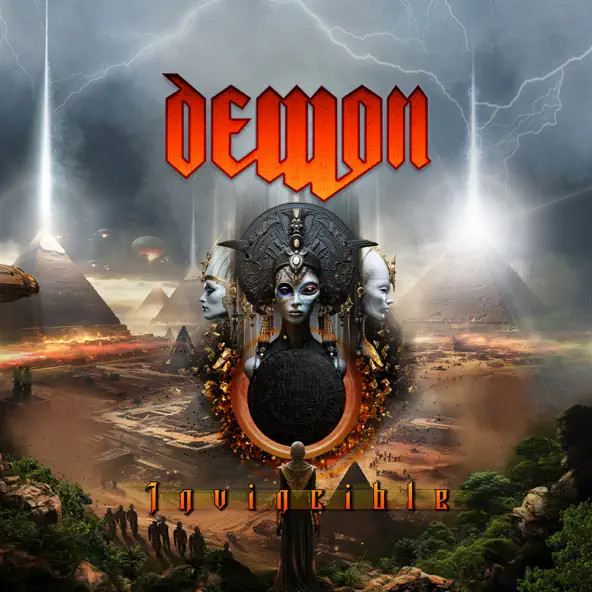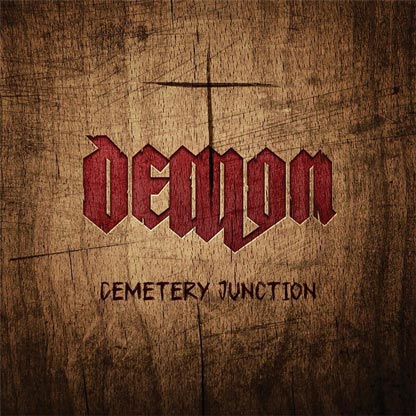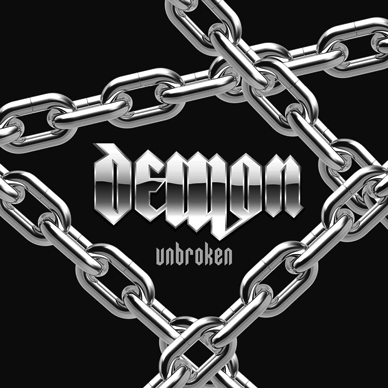Demon - Interview
In this exclusive interview, vocalist Dave Hill shares details about the creative process behind "Invincible," Demon's new album, revealing that, although it's not a concept album, the cover art and title reflect an idea of immortality and human resilience. He explains that the album was born in the midst of the pandemic, a period of isolation that pushed the band to write new songs. Hill highlights the album's diverse sound, which combines heavy elements with epic passages, resulting in a work that represents a synthesis of the legendary NWOBHM band's career.
The positive reception of the album seems to have revived interest in the band, which is celebrating 45 years of its career. Hill reflects on the importance of the New Wave of British Heavy Metal, a movement they were originally part of. Despite the difficulties faced, Demon has managed to stay active and relevant, thanks to the dedication of its members and the constant pursuit of musical innovation. Finally, he hopes that Brazil will be included in the current celebratory tour itinerary.
Marcelo Vieira

Analyzing the cover, title, and artwork of "Invincible," it occurs to me that it's a tribute to humanity, right? Like, heaven and earth will pass away, but we, human beings, will remain standing. Am I off?
Yeah, I mean, the album is not actually a concept album. If you're referring to the cover, the artist who designed it had an interesting idea. When I first discussed it with him, he told me about a tribe that lived two thousand years ago. I think they're called the "Aduma and Ucar". I'm not sure if you're familiar with them. The cover depicts that civilization.
We have a title called "Invincible" because we felt that having been around that long, we were invincible. I sent some songs to the artist, and when he sent back the cover, I thought, "Hmm, I like it." We liked what we saw and what he was conveying. Although the album was already written by then and the songs were completed, the cover seemed to fit perfectly. Even though it's not a concept album in the traditional sense, most of the songs have their own concepts, even if not as a complete cohesive product.
Which experiences inspired you personally during the creative process of the album "Invincible"?
I mean, with this album, it was actually written during the period covered. I thought the whole world found itself at home, unable to live as we had before. Bands couldn't play, and we definitely couldn't; we had to cancel a lot of gigs and festivals. So, we were forced into a corner like everyone else.
The drummer, Neil Ogden, and I started writing songs together. We exchanged ideas, and that's how we began to create the material. By the time Covid was over, we had a lot of songs—more than enough for an album. What we wanted to do, like everyone else in the world, was to celebrate and rise up. So we went into the studio and made an album. It felt like a fresh start, and we felt really good. That's how the album came about.
What are the main differences between "Invincible" and the previous Demon albums?
I think, you know, I spoke to people earlier today during interviews, and they were saying it's like a best-of Demon. It's like a shop window of a particular thing. I think it is because it features all periods in time. You know, you've got tracks like "Face the Master," which has been a single and the video is doing great. That track is quite heavy. "In My Blood" is also quite heavy. Then there are epic-type tracks—though I can't think of a specific track right now—that are reminiscent of mid-term Demon, maybe from 20 years ago.
There's everything in there for me. It's that mixture because, as I said, after Covid, everybody was completely enthusiastic. If you're a musician, you wanted to make music because all our tours got canceled. So, we wrote songs and went into the studio with a new spirit, picking up all the periods of Demon, from "Night of the Demon" to "The Unexpected Guest." I think everything's in there.
What do you expect long-time Demon fans to feel when they hear this new work?
Well, up to now, I mean, you know, I've done interviews in Europe and Japan because we went to Japan a couple of months ago, and I've been overwhelmed. I've done all the music papers in Germany, France, and Japan, and obviously now I'm doing interviews for South America, Brazil, and other parts of South America. I'm overwhelmed because people are really liking the album. People say, "Wow, this is refreshing. We like the tracks." So, at the moment, it's really giving us a great sort of resurgence, as we say, for the band. Even though we've always kept going, always played, and always toured, this is really something special. Everywhere and everyone I've talked to is saying, "Thank you, what a good album, what a great album," and so on.
Do you feel you're reaching new fans?
I mean, there seems to be a lot of people, you know, who want to talk to us. A lot of people want to interview us, and a lot of people, as I say, are saying good things. So, I think sometimes you don't expect a band that has been going for forty-five years to suddenly get new interest. I mean, we've always been a bit of a cult, legendary band. We play festivals, and there are people singing songs from the first album. We're always playing old Demon tracks. I was just saying to someone that forty-five years ago, when we wrote "Night of the Demon", I didn't expect that anyone would still be talking about it a year later. If we go on stage and don't play "Don't Break the Circle" or "Night of the Demon," the crowd would be disappointed. So, in some ways, that's great. We play alongside thrash and death metal bands, and there's always a crowd there singing Demon songs. That's good. It grows throughout. I've met so many people at festivals, and many bands have come up and said when they first heard our first album or saw us play. I'm having breakfast at a hotel, and that's great. I never thought this band would have such lasting impact. It carries on, doesn't it? Perhaps in the new wave that's come now, there is the spirit of what we were doing all those years ago and still do now. I think there is respect. That's the word. We've always gained good respect, even though we've never been a major stadium band. I think people respect us for keeping going and maintaining a good standard of music.
Demon has completed 45 years of career. What's the secret to keeping the band alive and relevant for so long?
I think, I mean, the band's been together in its current form for nearly 20 years, which is quite amazing. And I think it's because the members want to play and genuinely like the music. They're all individuals, but when we get on stage, it's like a brotherhood. It works, and we all play for each other. If someone's having a rough evening because the equipment's breaking down or something like that, all the members of the band step up and pull together. We all love the music and are always inquiring about the next gig or where we're going next. I think enthusiasm is the key. We have a band that's enthusiastic about whatever we do.
How do you see the importance of the New Wave of British Heavy Metal (NWOBHM) to the history of rock?
Yeah, I think it's—I mean, I've been asked that three or four times today—and I think when we started and were playing during that period, I had no idea it was called the New Wave of British Heavy Metal. It was only years later that people started referring to it as the New Wave. I thought, "Oh, that's what it was called." At the time, we were just making music and playing every club available. I never got to see many of those bands unless we played with them because we were always performing, so I didn't go to gigs and watch the bands of the New Wave—they'd be playing somewhere, and I'd be somewhere else.
But I think it's become very important. When we went to Japan a month ago, there were bands like Oz and Titan from that period, and we had a big audience. It was the 45th anniversary of the New Wave of British Heavy Metal. I thought, "Oh, are we going to Japan because we're Demon?" But yes, it's worked around the world. People remember that period. From it came many big bands, like Saxon, Def Leppard, and Maiden, of course. We continued from then and found success in Europe. When the New Wave sort of died—which it did, with many of those bands not playing anymore—they came back later. But it's definitely made its mark in the history of music.
In what specific aspects do you believe Demon differed from the other bands in the movement?
I think we survived because, after those early days, a lot of the gigs in Britain dried up. The American invasion came, Thrash happened, Bon Jovi emerged, and Glam took off. So, there was really nowhere to play if you were from the New Wave of British Heavy Metal, and you weren't Saxon or Maiden. Most of the bands finished. But Demon was fortunate enough to have some reasonable success in France, Germany, and Europe. So, off we went, and we spent quite a lot of time there, which kept the band going. That's why we continued.
Also, I never wanted to make the same album twice. As you'll notice with Demon, there are some very different albums. I grew up listening to Deep Purple, Pink Floyd, David Bowie, and Black Sabbath, and none of those bands ever made the same album twice. There was always something different. I thought if we ever got to make albums, I would like to move on and be able to innovate. In some ways, when the movement started to fade in popularity in those early '80s days, I think we could keep going because of that. Unless you were a big band, you had to play in places that had bought the material. And then we continued.
In addition to "Invincible," the classic trilogy "Night of the Demon," "The Unexpected Guest," and "The Plague" was recently re-released on CD in Brazil. What is the importance of this trilogy, especially "Night of the Demon" and its title track, to Demon?
Oh, I think that those albums are amazingly important, as I say. I'm grateful, you know, even though I sang on them and co-wrote everything. I'm still quite grateful for those albums because I think if we hadn't made them, we wouldn't be doing what we're doing now. I mean, they are known wherever we go. You might even find a small island in the middle of the Pacific where someone would probably know some of "Night of the Demon" or "Don't Break the Circle," even if they didn't know who the band was. So, you have to be eternally grateful for those.
For me, they can be reissued many times. We did remix "The Unexpected Guest" because it lacked a little bit of bottom end. The tracks were slightly thin on the original, even though the original has always done well for us. Like I say, without that album and "Night of the Demon," and the playing, we wouldn't be here now. The remix has been well received. I'm not always keen to touch something that some people might say is a classic, so I think we'd better not touch it. We kept it exactly the same; it's just got a warmer sound and a better bottom end. So, yeah, I mean, those albums— we're grateful forever and a day.
Speaking of Brazil, Demon has never been here. It's about time, isn't it? Are there any plans to finally make it happen?
Well, I'm hoping so because, as I say, I've spoken to quite a few people from Brazil earlier, and I've said, "Well, it's a bit like Japan. You know, we've released all the albums for 40 years, and I think we even had one of the albums charted in Japan. We've always been known there, and I used to do interviews where they'd ask, 'When are you coming to Japan?' I'd say, 'Well, when someone asks us.' They'd reply, 'What do you mean?' I'd say, 'Tell some promoter or something. Something will come up.'"
I mean, the last time we should have gone, COVID happened in Japan, like everywhere else. Then, two years ago, they had some political problems, so we didn't go then. But this time we have been, and people came with every album, every single we'd done. I think I saw some of them that I haven't gotten myself.
So, it's the same as South America. We were talking to a promoter earlier this year, and I think he sends bands to South America and does Colombia and places. I asked, "What about Brazil?" The things I've seen from British bands, big bands or even smaller ones, people say, "You've got to go to Brazil." I say, "Yeah, well, we're not hiding in an ivory tower. If you know anybody, tell them Demon wants to go."
With the new album, there's a lot of interest coming in from a lot of places thinking, "Ah, Demon, yeah, I like Demon, but I didn't know they were still around or doing this." There has been talk of it, and hopefully, it's the only place in the world, South America, that we haven't been to yet, but I'd love to go.
To conclude, what legacy would you like these albums to leave for future generations of fans?
I think what people have said to me when I've met them in hotel bars and with new bands is, when we started all those years ago, me and the late Miles Stoner, who unfortunately passed away after the third album, all we ever wanted to do was make a contribution to rock music. The money never mattered. I mean, of course it didn't. If the first two albums had gone massive, we'd have probably played another 10 albums and made them the same. I'm contradicting myself now—what I said before was a joke. I just wanted to make a contribution.
When we finished, someone quoted us the other week with the new album, saying, "Well, I'm sure this band deserved to have made a contribution to rock music." I thought, "Wow, it's taken 45 years, and someone has actually said what I think." Just being remembered and making good, honest rock music, and knowing that enough people have been affected by what we do, has made it a great journey. It's taken me to places I never would have been. It's great to make a new album and still see those people.
Link for the video version: https://youtu.be/kirka3xzn-4
Discography
Upcoming Releases
- Morrath - Obscure Abominations - Feb 25
- Chalice - Divine Spear - Feb 27
- Blackwater Drowning - Obscure Sorrows - Feb 27
- Vide - Aux Enfants Des Ruines - Feb 27
- The Leaving - The Leaving - Mar 06
- Serpent Icon - Tombstone Stories - Mar 06
- Insect Inside - Reborn In Blight - Mar 06
- Triumpher - Piercing The Heart Of The World - Mar 06
- Lömsk - Act II - Of Iron And Blood - Mar 06
- God Against Humanity - The Judgement - Mar 06
- Miserere Luminis - Sidera - Mar 06
- Gravemass - This Is The Way - Mar 06
- No/Más - No Peace - Mar 13
- Monstrosity - Screams From Beneath The Surface - Mar 13
- Against I - Anti Life - Mar 13
- Empire Of Disease - While Everything Collapses - Mar 19
- Hanging Garden - Isle Of Bliss - Mar 20
- Putred - Blestemul Din Adânc - Mar 20
- Gaerea - Loss - Mar 20
- Diatribes - Degenerate - Mar 20



